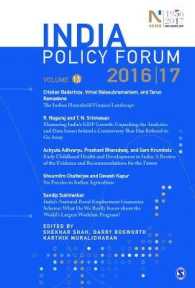- ホーム
- > 洋書
- > 英文書
- > Politics / International Relations
Full Description
Despite China's alignment with Russia being one of the most significant factors shaping the international order, the dynamics of their historic relationships and, more importantly, the sources of China's alignment policy remain underexplored. In this book, National Role Conception and Neoclassical Realism, a synthetic exploration into the Sino-Soviet alignment, Guangyi Pan investigates this question by analysing the changes in China's national role conception from a cross-level perspective.
Adding value to existing scholarly works on China's decision-making logic, he examines two critical and dramatic moments in the history of Beijing's alignment policy towards Moscow: the Sino-Soviet split in the 1960s and the normalisation in the 1980s. Based on massive historic documents and archives, he argues that the evolution of Beijing's approach to aligning with Moscow results from its changing perception of China's role in the world platform, especially its role relationship with the Soviet Union. The fundamental logic lies in how China positions itself, with the Soviet Union long serving as a mirror reflecting Beijing's desired roles during pivotal transformations. By developing a more rigorous and coherent framework to analyse role conceptions, Guangyi Pan explores unit-level factors - including leader images, elite cohesion and political culture - alongside the impact of systemic stimuli. This approach constructs the complex process of role formation, evolution, performance and policy outcomes, offering a comprehensive understanding of China's alignment with Russia throughout modern history.
Aimed primarily at scholars whose research fields include international relations theory, the Cold War history and politics of China, National Role Conception and Neoclassical Realism may also be of interest to foreign policymakers, students and political history enthusiasts.
Contents
Introduction: the myth of the Sino-Soviet alliance Part 1. Key concepts Chapter 1. Reviewing the Sino-Soviet relationship. Chapter 2. Theoretical development. Chapter 3. Methodology. Part 2. The Sino-Soviet split Chapter 4: Brothers in conflict: China's evolving national role conception in the socialist bloc, 1956-1960. Chapter 5: Towards the split: China's changing roles and the struggle for communist leadership, 1960-1966 Part 3. The Sino-Soviet normalisation Chapter 6: Defining 'normalisation': China's modernisation and Sino-Soviet rapprochement. Chapter 7: 'Farewell to the past': the road to normalisation, 1986-1989. Epilogue: Before the smoking gun: bridging causation across multi-level factors








